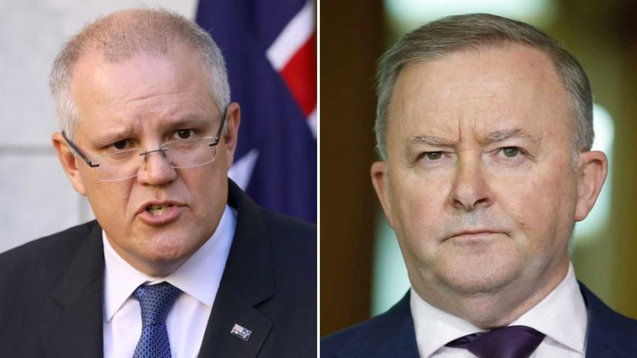
|
|
Both major political parties are treading nervously on climate
policy. (ABC News: Jed Cooper, Matt Roberts)
|
In an all-hands-on-deck approach, the US President declared Wednesday to be "climate day at the White House", as he unveiled plans to freeze oil and gas leases on public land and double offshore wind energy.
He's converting the vast government car fleet to electric vehicles (made in the USA) and plans to host a climate summit of world leaders in April. The climate crisis, he says, is an existential threat.
Joe Biden signs three executive orders to tackle climate change.
Australia, meanwhile, remains stuck in climate policy paralysis, with both major parties treading nervously.
Prime Minister Scott Morrison supports reaching net-zero carbon emissions, but he can't say when this should happen — a rather important part of the equation. He wants more gas in the energy mix, but it's unclear who will pay and whether a big new gas plant is even viable.
And even the idea of funding a new coal-fired power plant won't go away.
Deputy Prime Minister Michael McCormack, fending off the never-ending agitation from his National Party backbench, still flirts with the idea of taxpayer subsidies for coal. Treasurer Josh Frydenburg says it's not going to happen.
Labor's shift in emphasis
Labor, meanwhile, has been unable to capitalise on any of this Coalition confusion. Nearly two years on from its third consecutive election defeat, the ALP is still trying to work out where to land with its vexed climate policy.
Anthony Albanese made a smart political and strategic decision early last year to commit to the target of achieving net-zero emissions by 2050. He read the room and was helped by the overwhelming support for the 2050 target amongst business groups and the international community.

|
|
Labor's Mark Butler has been shifted out of the climate portfolio. (ABC News: Matt Roberts)
|
Albanese's decision to replace Mark Butler from the Labor left with Chris Bowen from the Labor right in the climate portfolio is at the very least a symbolic shift.
Butler had promised Labor would adopt "medium-term targets consistent with the terms of the Paris climate agreement".
A more cautious Bowen only says Labor's policy will be "evidence based" and "economically focused". We're told this is about a shift in emphasis, not policy direction.
It's now all about the "jobs" potential of taking climate action, rather than just saving the planet.
How will climate policy deliver jobs?
The proof, though, will be in the pudding. It's one thing to talk about "framing" the debate around jobs, it's another to demonstrate how your policies will deliver those jobs.
Bowen is now tasked with achieving the elusive Labor goal of landing a suitably ambitious and credible climate policy that doesn't spook voters in regional Queensland.
Albanese's instinct is not to rush into announcing these policies. He wants to see how global events play out this year, referencing this year's climate summit in Glasgow in particular.

|
|
Scott Morrison supports reaching net-zero carbon emissions but can't
say when this should happen. (ABC News: Pedro Ribeiro)
|
And there's unlikely to be any pressure from the opposition for the Government to be more ambitious, with Albanese also waiting to see how Glasgow plays out.
The Glasgow summit isn't being held until November, which could well be after the Australian election, depending on when the Prime Minister decides to send voters to the polls.
That doesn't mean nothing will happen in the climate debate before Glasgow; other countries will be making commitments throughout the year, with the Biden Administration likely to be leading the charge.
It's hard to imagine either the Government or opposition will be able to avoid telling the world — or indeed Australian voters — before November what their respective plans are for Australian emissions.
Climate policy may not be just about targets, but nor can targets be ignored.
Links
- US President Joe Biden pauses oil and gas leases, cuts subsidies in 'bold' climate steps
- (AU) ‘Breathtaking’: What Joe Biden’s Sweeping Climate Plan Means For Scott Morrison
- (AU) The Verdict On Australia’s Emissions Targets: Catastrophic
- (AU) Politics Of Carbon Has Ended, Scott Morrison Declares
- Australia, The Climate Laggard, Could Lead The World: Over To You, PM
- (AU) Albanese Is Running Out Of Time To Solve Labor’s Climate Crisis. He Needs A Plan That Works For Two Australias
- (AU) Cowardice: What Morrison And Albanese Have In Common On Climate
- (AU) Anthony Albanese Says Coal Mining Could Continue In Australia In A Net Zero Emissions World
- (AU) Australia’s Democracy Has Faceplanted And Labor Is Staring Down Some Disturbing Truths
- (AU) What Albanese Could Have Said: We Lied – Australian Coalmines Have No Future

No comments :
Post a Comment